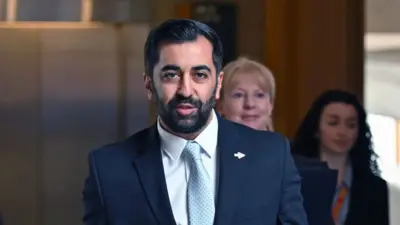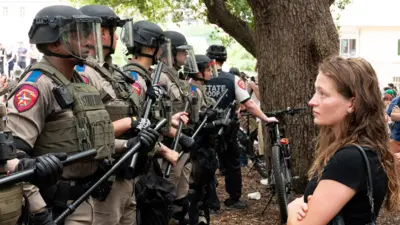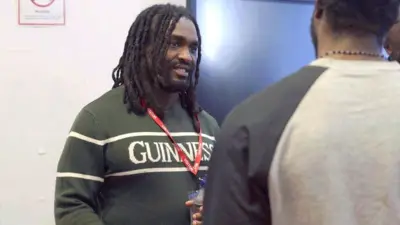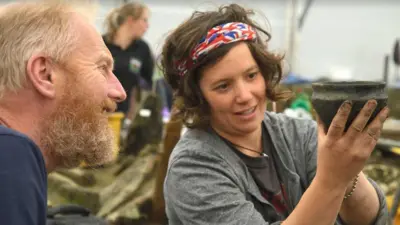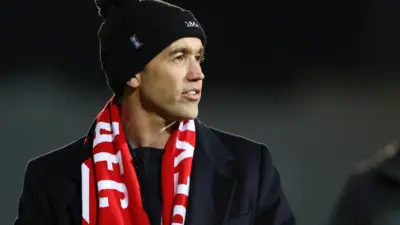We've updated our Privacy and Cookies Policy
We've made some important changes to our Privacy and Cookies Policy and we want you to know what this means for you and your data.
Manchester Arena Inquiry: Bomber's brother had IS material
Image source, MAI
The Manchester Arena bomber's elder brother had a "significant" amount of extremist material when he was teaching at a mosque, an inquiry has heard.
Ismail Abedi helped with Quran reading in Arabic in classes at Didsbury Mosque between February 2014 and July 2017.
The Manchester Arena Inquiry was told images of him and his brothers holding weapons and pro-Islamic State material was found on his devices in 2015.
A mosque trustee told the inquiry "no radicalisation" was taught there.
Twenty-two people were killed and hundreds more injured when Salman Abedi detonated his homemade device at the venue on 22 May 2017.
The inquiry into the attack was shown a number of photographs which were recovered in 2015 when Ismail Abedi was stopped at Heathrow Airport on his return from honeymoon in Indonesia.
An investigation uncovered a "significant" amount of material supporting the Islamic State group, including music encouraging suicide missions and a "very disturbing" Facebook post of a man being burned to death in a cage, to which Ismail had added the caption "looking for seasoned firewood".
Also downloaded were images, which were believed to have been taken in Libya around the time of the country's civil war in 2011, of both Ismail and Salman Abedi and their younger brother, Hashem Abedi, who was jailed for life for aiding the bombing.
Image source, MAI
Image source, MAI
Image source, MAI
All three were pictured holding various weapons, while another undated photograph of Ismail showed him outside a bookshop pointing to a book about the Islamic State group.
The inquiry was told no action was taken against Ismail Abedi following the Heathrow port stop.
The 28-year-old left the UK in August, a month after he was summonsed to give evidence to the inquiry.
The inquiry also heard his mother, Samia Tabbal, worked as a teacher at the mosque between May and November 2014 and his father, Ramadan Abedi, was invited to perform the call to prayer at the mosque from the late 1990s until the mid-2000s because of his "pleasant voice".
The hearing was later shown a video of a man, said to be Ramadan Abedi by Greater Manchester Police, making the call for prayer at the mosque in 2015.
Ramadan Abedi and Samia Tabbal, who police want to speak to in connection with the bombing, are currently in Libya.
Image source, MAI
Image source, MAI
Mosque chairman Fawzi Haffar told the inquiry he did not know any of the Abedi family and had not personally met them.
He said his understanding was Salman Abedi had only attended as a child, but he could not be certain as the mosque did not have a membership scheme and was open to all Muslims.
He said if Salman Abedi had visited the mosque, it would only have been on a "pretty limited, if not fleeting, basis".
He said the mosque, which was also known as Manchester Islamic Centre, had no knowledge or any association with attendees who may have gone to Libya to fight and did not "encourage anyone to get involved with wars abroad", as it would be "in contradiction of our charitable objects".
"We don't allow groups to come and hijack the mosque," he said.
"We are very clear, even through our imams, that we are a mainstream mosque welcoming all Muslims, but we are in the middle of the road."
He told inquiry chairman Sir John Saunders he was not aware of the ideological material found in Ismail Abedi's possession in 2015 and would not have let him teach young children if he had known.
He also denied claims from Mohammed El-Saeiti, an imam at the mosque, that a number of Libyans with extremist views were given a "safe space" to meet at there in 2015 and 2016.
He said the mosque's leaders "never thought that there might be anyone who might have any radical thoughts and we knew for sure there was nobody there who would be teaching radicalism because that is against our ideology".
"As far as I'm concerned there was no radicalisation," he added.
Image source, Family handouts
Counsel to the inquiry Paul Greaney QC asked him if it was "a fair observation to say that Didsbury Mosque was not doing enough to address whether members of its congregation were being radicalised?"
Mr Haffar said that was "absolutely not" the case.
John Cooper QC, for the bereaved families, said the mosque had "exercised a dereliction of its duty in protecting people" and asked Mr Haffar if it "could have done far more to stop Salman Abedi and his evil cohorts doing what they did?"
"No sir, I absolutely categorically refuse that," Mr Haffar replied.
"My children could have been at the Arena. I could have been there.
"Unfortunately it's the victims of the parents who are here."
The inquiry continues.
Top Stories
Features & Analysis
Most read
Content is not available

